Text
Booksmart (2019)
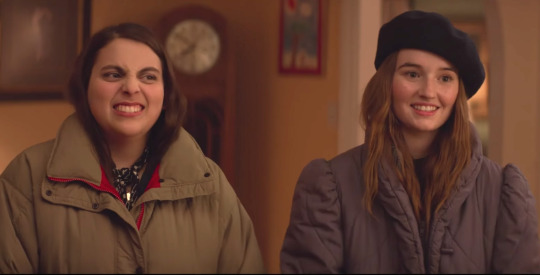
Directed by Olivia Wilde
Rating: 80/100
Olivia Wilde’s compelling directorial debut is Gen-Z's answer to Superbad; a comparison which is eerily fitting when you consider the film’s genetic connection to Superbad’s Jonah Hill (Beanie Feldstien is his younger sister). Amy (Kaitlyn Dever) and Molly (Beanie Feldstien) have invested all of their time and energy during highschool pursuing the holy grail: places at the distinguished college of their dreams. However, the pursuit of academic excellence has come at a cost - they have become social pariahs; too mature and blinkered to arouse sympathy from their peers, who are more interested in the hedonistic pleasures of screwing and partying. On the final day of school, the illusion of their superiority is shattered when they realise that their fellow slackers have gotten into the very same prestigious colleges; only without expending half the effort. Thrown into an existential impasse the girls decide to embark on a mission to make up for lost time and let loose by attending the end of year bash; a belated chance to indulge in all the desires they have put on the back-burner.
Superbad left a dick-sized crater in American teen culture when it introduced us to Seth Rogan and Evan Goldberg’s horny, adolescent alter-egos back in 2007. Part of Superbad’s meteoric triumph was down to the way in which it modernised the discourses which were circulated by raunchy films of the late nineties and early noughties about the teenage experience: the most popular being that of the American Pie franchise, which had its hapless characters attempt to scale the “pussy pedestal” and lose their virginity. Superbad was about that too - to a certain degree - however, it was more about the journey itself, as the naive heroes attempt to navigate a dark, adult world. Booksmart is another inversion and re-invention of the genre; Wilde’s picture is about exploring, reflecting on, and breaking through the teenage illusions which have led our protagonists’ to their alienation and dissatisfaction. The two swats must cast off their haughtiness and misconceptions to decode a world they have kept at arm’s length with a perpetual sneer; a self-fulfilling tonic for their estrangement.
Driven by two enigmatic and savvy performances by Dever and Feldstein, the film moves at a catatonic pace; stoked by a bombastic soundtrack ripped from your teenage daughter’s Spotify playlist. Their faultless chemistry is intensified by the endless laughs which emanate from the witty and astute screenplay (Emily Halpern, Sarah Haskins, Susanna Fogel and Katie Silberman, all have writing credits). By leaning on the strength of these two factors, Wilde is able to offer an inversion of the “mean girls” narrative, where she substitutes tits and teeth for mental supremacy, for all of Amy and Molly’s dorkiness, they are extremely judgmental and influenced by unfounded pretensions which inadvertently hurt other people’s feelings and draw contempt - and rightfully so. However, because these pretensions emanate from a place of insecurity, that we all can all identify with, we root for them to overcome them, so we can watch the wallflowers bloom.
Don’t be a stranger! Follow me on Letterboxd or Twitter!
7 notes
·
View notes
Text
Scoob! (2020)
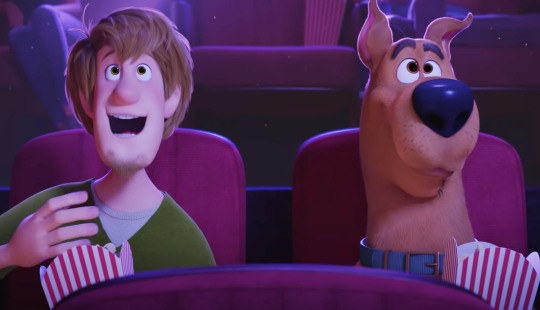
Directed by Tom Cervone
Rating: 36/100
Tom Cervone’s Scoob! is the first film to arrive from the launch of Warner Animation Group’s nostalgia coup: in the winter the company hopes to profit from the multigenerational appeal of the beloved animated duo, Tom and Jerry, with their first feature film outing since Phil Roman’s less than successful attempt back in 1992. Also scheduled for release next year is the reboot of nineties favorite Space Jam - a reboot which sees NBA Hall of Famer, Michael Jordan, substituted for a more contemporary NBA icon LeBron James (a project which smells so copiously of a corporate cash-grab that one feels slightly embarrassed on behalf of those who will be inevitably duped into the multiplex to watch the live-action fire dump burnish - I say this as someone who will rank amongst that sorry horde). If Scoob! is a harbinger of what is to come, then the horizon for the venture is ominously gloomy.
Everyone’s favorite gluttonous great dane returns to the big-screen in true Scooby Dooby Doo fashion: treadmilling through Venice Beach on top of a giant processed ham. It is not too long before he meets lonesome teenager, Norman, who turns out to be his future sidekick, Shaggy (although this is self-evident by his drab wardrobe, which hasn’t changed much since 1969). The two strike up a friendship, then make friends with some familiar-looking cool kids called Fred, Daphne and Velma, who all then miraculously grow up before our eyes in a ghoulish montage, all as the quintessential theme-tune thumps away in the background. It is from this point where Cervone deviates from the narrative blueprint which has made the series a mainstay across generations of children: that of a group of meddling kids who solve mysteries that on the surface appear spooky, supernatural and inexplicable, but in the end have a logical cause and conclusion. Instead he ditches the show’s DNA, brings in a host of characters from lesser known cartoon shows, such as, Dynomutt, Dog Wonder and Wacky Races, and throws Scooby and the gang into a nutty, kaleidoscopic adventure with knock-off minions, dwarf cavemen, the underworld and a terrifyingly garish incarnation of reality television mogul, Simon Cowell.
Cervone’s “throw everything at the canvas” approach - an approach which has been executed with greater precision and wit by their production company stablemates (the whole of the Lego franchise) - has the effect of laying waste to the inherent identity of Scooby Dooby Doo. This leads to a spooky uncanniness; one starts to realize that you could transplant all of the characters, and the film would still function to a certain degree. Aside from shadily paying lip service to fans by ham-handedly pumping in catchphrases, theme tunes and cartoon sound effects with the cold fluidity of a garden hose with a puncture, Cervone’s film is unable to re-capture the magic or conjure it up. This results in a film which drags by everlastingly in a mindless and colourful splooge. By the third act you find yourself consumed by a burning desire for Dick Dastardly - the film's pencil-stached villain - to live up to his aptronym by mercilessly slashing the Mystery Machine's brakes.
Don’t be a stranger! Follow me on Letterboxd or Twitter!
0 notes
Text
The Hunt (2020)
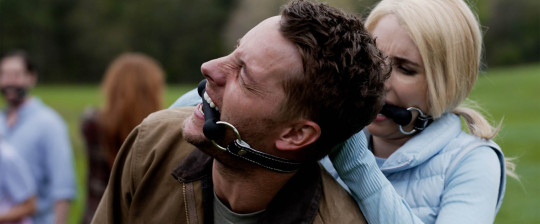
Directed by Craig Zobel
Rating: 68/100
The Hunt’s journey has not been a particularly smooth one. In Jordan Crucchiola’s article, “How The Hunt Came Back From Cancellation”, he details the issues surrounding the film’s production and release, which include: a knee-jerk bashing from Fox News and POTUS, delays due to two untimely mass-shootings and a subsequent cancellation. Finally, the film, which was completed in the summer of 2019, has seen the light of day; harnessing the controversy which has beleaguered its passage as rocket-fuel to propel its promotion. Take, for example, its swinish promo-poster which is stacked with capitalized, critical salvos pertaining to its inherent shock-value: DANGEROUS - Indiewire. I must admit, it is difficult to fully appreciate whether the quotations are truly hyperbolic or not, when, if like me, you have not spent an iota of time incubated inside the smoldering, politically divided cauldron of the United States. However, one would suspect that the only people who would find themselves outraged by this unyielding, blood-splattered satire are those who have not sat through its swift running-time. Craig Zobel’s The Hunt might not be the most cutting satire ever to fall into the lap of American audiences, but it might just be one of the most exhilarating.
Twelve right-wingers awake and find themselves bound and gagged in an undisclosed forest with a crate of weapons and ammunition at their disposal. Amidst the confusion, bullets start to reverberate, and they find themselves burrowing deep into the forest in search of refuge from the gunfire. It is not too long before they realise that something/someone is hunting them. Stepping out from Zobel’s menagerie of prey - a hodgepodge of characters who seem to cover the whole superficial spectrum of Republican villainy and insanity - is Crystal (Betty Gilpin), who using a composition of cunning and ass-kickery begins to turn the tables on her antagonists; blasting their entrails all over the scenery with her sawed-off shotgun.
The controversy of the film does not stem from its gratuitous gun-violence - and believe me, it is wonderfully gratuitous - it stems from the identity of the huntsmen. They belong to the other side of the political divide: the liberal elite. It is easy to understand why The Hunt appeared on the surface as a burning red rag for those who see the world through the narrow and binary lens of dogmatic party politics. However, on closer inspection, it is not like Zobel is using The Hunt as a vehicle to enact a sick, leftie, Hollywood simulation of some latent wish-fulfillment; he in fact using the perversity of the situation to light-heartedly ridicule the hypocrisy of liberal and republicans alike, whilst also identifying the absurdity of their vehement tribalism. For neither side escapes unscathed from writers Nick Curse and Damon Lindelof’s scornful pen, as they scribble up their crude and pithy caricatures - most of which end up dismembered and blown to smithereens by the fall of the credits.
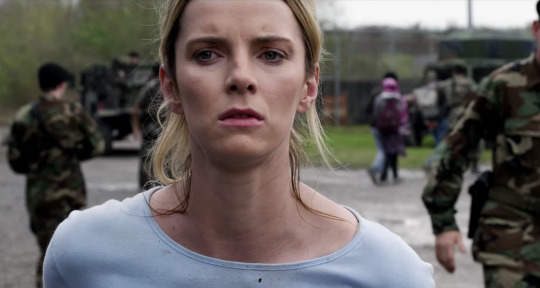
Inside their bunkers, holding their semi-automatic rifles with limp wrists and a gawky, wallflower confidence, the lefties quibble about famine, climate change, veganism and cultural appropriation in between lashings of unadulterated slaughter. The humanitarianism which is said to be the guiding principle of their ideologies is discarded in the face of an opposition which contradicts their enlightened worldview. Thus they unknowingly replicate the power-structures of oppression which they seek to disassemble - a cruel and swift authoritarian death machine; those quick to unleash the world “nazi” in Twitter discourse find themselves becoming what they fear the most. In a similar sort of role reversal the rightwingers find themselves becoming incarcerated in a refugee camp.
Sharing a similar genome as Kinji Fukasaku’s Battle Royale - and its many YA predecessors - The Hunt is a novel, dystopian actioner which disguises its DNA beneath a thin layer of blithe satire which is played up for self-deprecating laughter rather than serious reflection. Ironically, for a film which bathes gleefully in in the mudslide of rhetoric and soundbites, its protagonist, Crystal, moves through the chaos with near-silent pragmatism and apathy. It is as if she is as bored as we all are with the circus which dominants political discourse. Zobel adds a few clever narrative twists and turns to keep the audience second guessing, and treats us to an entertaining, Kill-Bill inspired boss fight before the credits fall. Despite the overzealousness of the controversy that the film has courted, The Hunt is not nearly as dangerous or biting to warrant the outcry. If you want a film that attempts to dissolve or examine the fatberg of compassionless tribalism which thwarts any manner of change in American society, then you will be disappointed. However, if you are able to turn off the analytic part of your brain, The Hunt is a swaggering, winking piece of fun.
#the hunt#film#review#movie#craig zobel#battle royale#kinji fukasaku#hunger games#betty gilpin#right wing#conservative#leftie#democrat#republican
0 notes
Text
Can You Keep A Secret (2019)
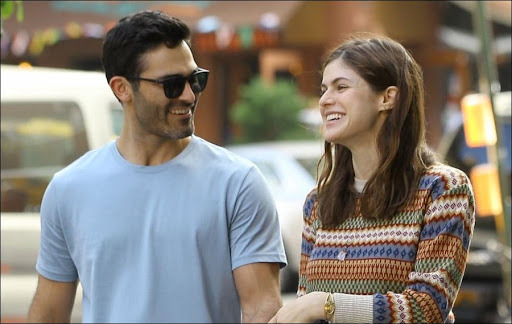
Directed by Elise Duran
Rating: 22/100
Adapted from Sarah Kinsella’s NYT best-selling novel of the same name, Can You Keep a Secret is a rom-com which has a peripheral interest in the concept of a secret’s ownership. I say peripheral because Elise Duran’s film quickly retreats to the safer recesses of the genre; its central question extinguished beneath an unbearable and incessant goofiness. Emma (Alexandra Daddario) is as hapless as a marketer, as she is in the realms of romance. Tired of her prosaic love-affair with gillette-wearing dork and colleague, Conor (David Ebert), Emma drunkardly confesses her dissatisfaction to a handsome stranger on a turbulent flight home from Chicago - this confession soon leads to another, and another... until she has unveiled her innermost secrets: from the quotidian to the existential. Unbeknown to Emma, and to her utter mortification, the stranger happens to be the CEO of the company she works for.
The coincidences and the cliches come thick and fast as Duran leads us into a class transcending romance between Emma and her boss, Jack (Tyler Hoechlin). Jack is the feminine-projection of masculine perfection: tall, dark, self-sufficient, successful, superficially charming, and, perhaps most important of all, emotionally closed off; a mountain to scale; an enigma to decipher. He also has the benefit of knowing all of Emma’s secrets, which he uses to beneficently coax her into his arms with a cool combination of flirtation and workplace horseplay. The relationship from the jump is defined by its up-punching genesis, as Emma lays on the sentimental gushiness like a thick, sickly honey. Her overwhelming gratuity is complimented by an irksome inferiority complex - a sombre combination whose fruits Jack drinks in, gleefully,
like a flute of crisp champagne.
Emma’s secrets give Jack a certain leverage; an unfair distribution of power which soon becomes a sticking point in the fledgling romance. But, by this point we have lost all enthusiasm for the film. We have watched too much of it through our fingers, attempting to shield ourselves from the barrage of comedy clangers and clunky dialogue, that far from immersing ourselves in starry-eyed escapism, we get consumed by our burning desire for refuge; for the falling of the end credits.
#tyler hoechlin#film#review#movie#david ebert#sarah kinsella#alexandria daddario#can you keep a secret#rom-com
9 notes
·
View notes
Text
Blonde Fist (1991)
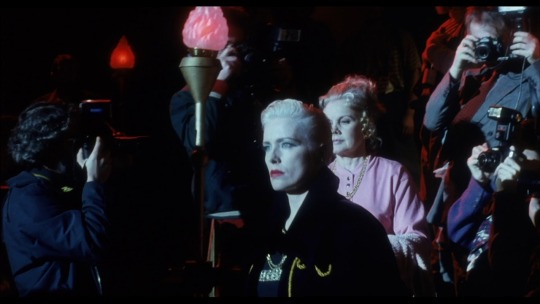
Directed by Frank Clarke
Rating: 17/100
Clarke’s debut (and only directorial feature) was a bizarre transatlantic vehicle for his sister, Margi Clarke. Margi had risen to stardom on the back of appearing in Chris Bernard’s Letter to Brezhnev (1985), as well as, establishing herself as a household name with a starring role in the BBC’s primetime series, Making Out (1989-1991). In Blonde Fist, Margi becomes Ronnie O’Dowd - a rather crass embodiment of working-class and Liverpudlian stigmas - who solves all her disputes with wheeling fists and caveats of clunky one-liners. Her methods of conflict resolution soon land her behind bars. After one of the most laughably unconvincing prison sequences - an act which climaxes in a high-octane escape via tractor - Ronnie crosses the Atlantic; swapping the bleak Merseyside council estates for Manhattan skyscrapers in the search for her estranged father. Clarke’s aimless rags-to-riches tale of feminine empowerment is a woeful slog of melodramatic conventions and irksome over-acting. Carol Baker and Ken Hutchinson do their utmost to make the best of the material, allowing the audience several slight reprieves from the Clarke siblings’ sheer incongruousness. Ultimately, Blonde Fist feels like the hackneyed result of some extraterrestrial film club’s homage to Ken Loach. The onscreen dissonance is particularly spooky considering the Clarke siblings hail from Kirby, Liverpool. Far from attempting to explore working class culture, they seem only interested in exploiting its ugliest facets; from shoplifting, to single motherhood, abandonment and violence for cheap laughs and half-baked characterisation. Watch at your own peril…
1 note
·
View note
Text
Fantasy Island (2020)

Directed by Jeff Wadlow
44/100
Jeff Wadlow (Kick-Ass 2) opens his re-imagining of ABC’s chimeric drama, Fantasy Island with an uncanny homage to its original predecessor; a sweeping panoramic shot of a seaplane soaring above the sultry visage of a verdant tropical island and its iconic, alabaster mansion - a nod to the opening sequence which played into living rooms all around the world in the late seventies and early eighties. Of course, Wadlow is not the first to try and reprise the series, in 1998 ABC brought on board director, Barry Sonnenfeld (known for his work on The Addams Family films) and star, Malcolm Mcdowell, for an ill-fated reboot which was met with tepid reviews. Unsurprisingly, it was not renewed for a second season.
Over two decades later and Fantasy Island returns, this time on the big-screen having been given a Blumhouse Productions horror make-over. Five people arrive on the aforementioned seaplane having won a competition to visit a mysterious island owned by mysterious entrepreneur, Mr. Roarke (Michael Peña), who claims that he can grant his visitors their most desired fantasy. At first, the place appears to be nothing more than a luxurious health-retreat, with its smocked assistants, the liberal flowing of imported rum and picturesque coastal views, however, it soon becomes apparent to the guests that Mr. Roarke has much more up his sleeve than novel wellness gimmicks, virtual reality or LARPing sessions. No, like a strange, silicon valley sorcerer, Roarke, can literally conjure up their innermost fantasies.
The guest’s fantasies range from the debauchery of a Pablo Escobar-esque pool-party adorned with lusty supermodels, fireworks and hand-grenades; to the sentimentality of a romantic do-over; to that of getting revenge on a high-school bully; or realising one's lifetime ambition of enlisting in the military (Yes, seriously. Well, kinda). It is not long until the shimmer of these fantasies start to go awry. Wadlow takes great pains to draw the attention of the audience to the dark pools of liquid which drip ominously from the upholstery and decor as these fantasies play-out. The guests also begin to have nightmares/visions of bloody and charred zombies which flash onto the screen and disappear episodically. As the “chills” start to crank-up, the central idea of the film starts to bubble to the surface: that of the classic magic genie fallacy - the fallacy of getting what you have always wished for.
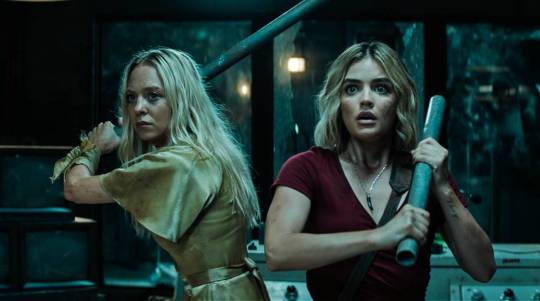
The problem with Fantasy Island is that although it has the sensibility of a horror film woven into its DNA, it very rarely provides any of the sensations which we associate with the genre. It makes a rather fitting companion piece to last year's woeful In The Tall Grass: a horror-fantasy in which a band of people try to escape from a metaphysical field of grass. Both of the films’ concepts build a certain level of intrigue, offering the audience a puzzle of sorts to piece together, but this intrigue dissipates around the halfway mark, when the film fails to communicate or explain the mechanics of its own internal logic, and thus to mask the discombobulation, it retreats back to the safety of the horror genre’s conventions: grizzly serial killers, ghouls, isolation, fatalism, gore and violence.
If one was to be completely fair to Fantasy Island, by avoiding the temptation to join in the critical dogpile, there are discenerable and promising elements which shine out from the murky vacuum of glaring plot holes, a few spotty and lacklustre performances (Michael Peña seems mildly embarrassed to have accepted the pay-check) and a general foolishness which pervades and marrs the picture almost beyond salvageability. It is these promising elements, which on reflection, form the basis for the inconceivable truth: I enjoyed it to a degree. I know much of this enjoyment derives from the source material - or should I say, the possibilities of the source material, which are left half-explored by Wadlow and his two fellow writers on the project (Christopher Roach and Jillian Jacobs) in their unblinkered quest for box-office thrills. For if they had had the courage to travel down the Freudian avenue of dream interpretation they would have reaped sweeter fruits. For it is not the fantasies which are interesting in themselves; it is what these fantasies reveal about our unconscious, universal desires. They do flirt with the concept with some success, but ultimately pivot towards the more comforting ring of the surgical saw.
#fantasy island#film#review#movie#blumhouse productions#jeff wadlow#horror#maggie q#michael pena#michael peña#lucy hale#austin stowell#portia doubleday
0 notes
Text
The Nightingale (2018)
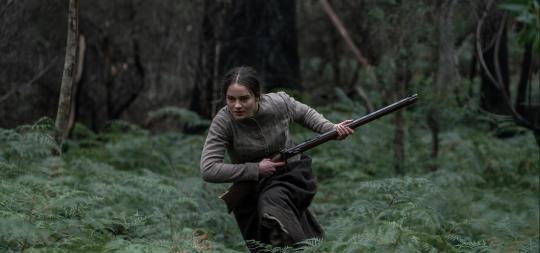
Directed by Jennifer Kent
Rating: 90/100
In 2014, Jennifer Kent’s directorial debut The Babadook shook the horror-genre - a genre that had become a lethargic goose gavaged with half-baked franchise fodder (Saw, Paranormal Activity and Insidious) and a litany of underwhelming remakes (Carrie and Evil Dead). The Babadook was a film which did not lean on cheap jump-scares or gratuitous gore, but instead lent into the psychological mores of maternal grief to conjure up a terrifying, jabbering monster whose presence alone was enough to cause the blood to curdle and the flesh to creep. Kent’s follow-up is a bold and self-assured transition from her roots, warping the audience back to early nineteenth-century colonial Australia, for a brutal and punishing pentonville revenge story.
Aisling Franciosi is Claire, Kent’s nightingale; an Irish convict and exile, who as the legal property of the ill-tempered and enterprising English Lieutenant Hawkins (Sam Claflin) is paraded in front of his men to warble beautiful, yet haunting, melodies. Held up in a ramshackle hut with her husband and newborn, Claire dreams of regaining her liberty and emigrating north - far from the brutality of the remote outback; crawling with debauched red-coats and savage aborigines warring over the land and its natural resources. After Hawkins denies to relinquish his hold over her, and Claire rejects his lascivious advances, Hawkins, and his gaggle of drunk underlings, commit the unthinkable. Kent in her unrelenting style provides the audience with no psychological exit route. She forces us to stomach the visceral violence and inhumanity by, not lingering on its gratuitous details, but presenting it unblinkingly; capturing the trauma, pain and horror, so we can creep behind the glassy eyes of her heroine; to feel the gravity of her loss and to comprehend the significance of her subsequent crusade. For the act is a complete evisceration of Claire’s future. As a woman, convict and Hibernian, she is left completely abandoned in an unforgiving world that has already firmly turned its back on her.
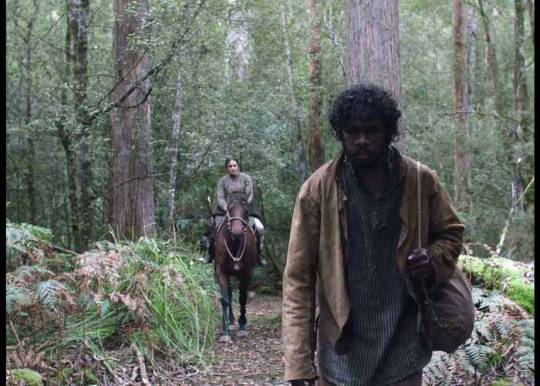
There is nothing more dangerous than a person who has lost everything. Upon discovering that Hawkins and his band of brothers have headed north in his perusal of a promotion, Claire sets forth on their heels, transforming the film into a quest narrative, sprawling across the bleak Australian bush - it is almost as if the colour has bled from the native scenery amping up the hostile and unrelenting tone of the picture. She soon hires Aborigine tracker, Billy (Baykli Ganambarr) to help her navigate the tough terrain. Kent’s film soon opens up a discourse on colonial land grabbing and genocide, as she drives the two characters through a landscape bearing its native wounds; mutilated aborigine corpses hang from its trees and once sacred and fertile land has become fields of ash - or worse, has fallen into white hands. Whereas, Claire’s revenge is geared personally towards her trespassers, Billy’s is a much broader anger. His people have been forced into the darkest corners of his country’s forests, with the prospect of starvation, slavery, murder and rape shadowing them eternally. Claire and Billy become bound by an absence of salvation - bound by a doomed fatalism which softens their misguided antagonism into something verging on platonic love.
Kent does wander back into familiar horror territory with a few delirious and paganistic nightmare sequences, however, The Nightingale’s terror is Hawkins, and his sidekick, Ruse (Damon Herriman). Sometimes pushing the audience’s credulity with the depravity of her villains, Kent subverts the contemporary stereotypes of native barbarism and zaps it into the stereotypes’ propagator. For it is the colonial rule which brings out the animalistic urges. Far from enacting Kipling’s imperial musings of the “white man’s burden”, the power bestowed upon the soldiers allows them to enact out there most base instincts without censor, leading to a world of barbaric violence for those who happen to cross their paths.
The Nightingale is a film that Kent wants to brand onto the audience’s brain. With help from an incredible strong ensemble performance, Kent has made a piece of work which is utterly unforgettable; a terrifying and triumphant observation of a whitewashed past.
#jennifer kent#film#review#movie#the babadook#sam caflin#damon herriman#baykli ganambarr#aisling franciosi#the nightingale#australian cinema#horror#revenge#colonialism#tasmania
4 notes
·
View notes
Text
Bombshell (2019)
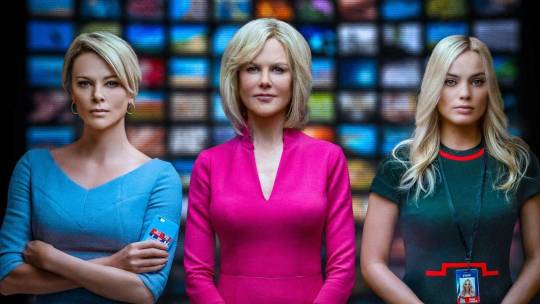
Directed by Jay Roach
Rating: 62/100
Bombshell is Hollywood’s first foray into the #MeToo movement; turning the spotlight on Fox News Corporation’s 2016 sexual harassment scandal. Roach adopts a threefold narrative; jumping between the stories of two high-profile news anchors at the station, Megyn Kelly (Charlize Theron) and Gretchen Carlson (Nicole Kidman), as well as, the fictionalised up-and-comer Kayla Pospisil (Margot Robbie). These narratives are unified by their ominous villain: Fox CEO Roger Ailes (John Lithgow). Roach’s film begins by diving headfirst into the 2016 presidential campaign - more specifically Megyn Kelly’s infamous twitter-spat with Republican candidate Donald Trump. Refusing to tow the company line, Kelly decides to confront Trump on his toxic misogyny, but soon finds herself scapegoated and lampooned by her own broadcaster, whose only interest is in satiating its audiences’ thirst for scare-mongering stories and confirming their viewers’ collective biases, in its hunt for the white whale: greater viewing figures .Similarly, Carson is also disgruntled by the internal misogyny of the company and starts to bite back, but finds that her outspokenness pushes her to relative obscurity and dismissal. The man behind the toxic culture, as well as, the women’s harassment is Ailes. Lithgow, barely recognisable in his bulging prosthetics, approaches the role with a barbaric and fiery energy, enveloping each scene in a litany of profanity and sexist jabs. Ailes is characterised by Roach as a paranoid and powerful monster, whose tentacles extend throughout the corporation, allowing him to continue his patterns of abuse by silencing his victims with promises of stardom and threats of termination.
Although, stylistically and tonally at least, Bombshell attempts to emulate the likes of McKay’s The Big Short and Vice (which is unsurprising considering writer Charles Randolph is behind the screenplay), with it’s quick-cutting exposition heavy scenes and tight dialogue. However, what we end up with in reality, is a film which is wholly coercive for the sake of dramatic effect. For Roach is unable to find a solution to his central conundrum: how do we make a film about sexual abuse, where the victims, for the majority of the audience, are considered morally abject? Instead of confronting the subject, or allowing the audience to draw their own conclusions, or use their own rationale to separate abuse from ideas; what we get instead is ideological whitewashing to make the character’s more empathetic to an overwhelmingly liberal audience. Characters, who have spent decades live-on-air espousing right-wing ideas, become suddenly disenfranchised or wink at the audience to let them know that they are just mercenaries in the ideological warfare. Randolph parachutes in a fictionalised closeted lesbian and democrat, as a researcher who fears exposure and despises the company, but has been unable to find employment elsewhere. Even Pospisil who believes in Fox’s rhetoric is characterised as a little too young and naive to hold her own convictions - in fact she implies that they are the convictions of her parents, who she reveals are lifelong Fox viewers. It is this layer of disingenuous which belays the film a certain level artificiality. As a spectator, you begin to wonder whether you are actually seeing the inner-workings of Fox, or just Roach and Randolph’s imagined conceptualisation of the mechanisation behind a regressive twenty-first century propaganda machine.
Despite my consternation, the subject at the heart of the movie is executed with impressive deftness. It is largely down to the strong performances of Kidman, Theron, Lithgow and Robbie that the film does not collapse into a peroxide farce, but develops in its final act into something compelling and vitriolic. Ironically, it is the allegorical character who becomes the emotional core of the movie: Pospisil. For Popisil is the embodiment of all of Ailes’ victims; a young and ambitious woman who is trying to make a name for herself in broadcasting. By separating from the narratives of Carson and Kelly - who it is inferred do not want to be remembered as victims - and inventing Pospisil, we are able to follow the journey of the victim and find a true sense of justice in the admonishment of her abuser. We are introduced to the degradation that female candidates are exposed to, and the guilt and shame which they carry with them long after the event. On the back of its performances and the story at its core, Bombshell just gets over the line.
#jay roach#film#review#bombshell#fox news#fox network#roger ailes#john lithgow#margot robbie#charlie#charlize theron#nicole kidman#movie#picture
2 notes
·
View notes
Text
Honey Boy (2019)
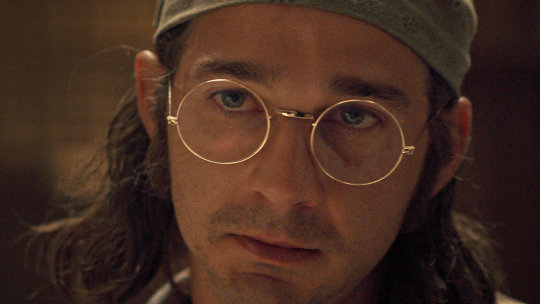
Directed by Alma Har’el
Rating: 90/100
Honey Boy written by Shia LaBeouf and directed by Alma Har’el is a peculiar, yet tantalizing piece of work. In 2017, Labeouf was arrested and charged with assault at a NYC Trump protest and ordered to complete ten weeks of rehab. During rehab, he took part in therapy in which he discovered that he was suffering from post-traumatic stress disorder stemming from his childhood. As the child star of Disney’s Even Stevens, LaBeouf grew up in front of the cameras; a self-assured and wisecracking kid who seemed beyond his years. Honey Boy guides the audience behind the camera and brushes off the “Disney magic”, to reveal a fraught parent-child relationship complicated by exploitation, drug abuse and a myopic will to succeed.
Replacing LaBeouf, only in name, is Otis, played by both Lucas Hedges and Noah Jupe as Har’el flits through the decades.The film’s structure mimics the process of LaBeouf working through his trauma. As Hedge’s Otis re-lives and tries to interpret meaning from his traumatic memories in rehab, we are transported back in time to Jupe’s Otis, a cigarette puffing twelve-year old, living in a decedent and depressing California apartment complex with his father James played by Shia LabBeouf. A surly veteran and failed performer himself, James is both Otis’s mentor and chaperone. Although, the driving force behind Otis’s success, James’s myopia and narcissism regularly morph him into an explosive entity of brawn and torment. LaBeouf delivers a terrifying and edifying performance as his father - who happens to look like dishevelled David Foster Wallace. As Otis’ hankering for love and affection from his father become increasingly stronger, so does his perception of his own exploitation. In the film’s most heart wrenching scene, a young Otis confronts his father about his own commodification. The aftermath is heartbreaking. For James is not the archetypal father who rectifies his failures through his prodigy, but a man so blinded by his own trauma that he is unable to comprehend someone else's pain.
Honey Boy is a film about finding meaning in traumatic memories - memories which are so fragmented that they rarely make sense but still evoke uncontrollable and destructive emotions that spill into day-to-day life. By deconstructing his own trauma, Otis is able to identify that his father was fighting his own demons: substance abuse, alcoholism, sexual felonies and divorce. By seeing himself in his father - by recognising that he is replicating his father’s narcissism and myopia - Otis is able to weave together his memories and make sense of them, moving him closer to a reconciliation with his father.
Honey Boy is a magnificent triumph.
63 notes
·
View notes
Text
Playing with Fire (2019)
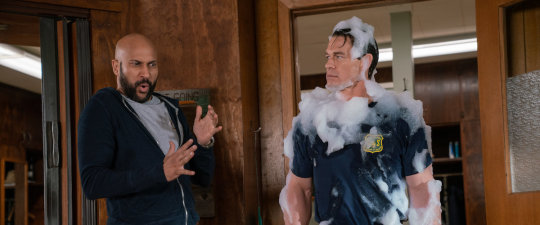
Directed by Andy Fickman
Rating: 18/100
Andy Fickman. Andy Bloody Fickman. Fuckman. A director who sets the bar so low with each outing that his career has become one big degenerative limbo. His latest, Playing with Fire, is a fumbling attempt to slurp from the Cena gravy train. The former wrestler turned comedy caricature is deployed as a bird-brained, uber-macho firefighter who becomes plagued by some ungrateful little twirps he saves from a house fire. Supported by his numb-skulled sycophants, Keegan-Michael Key and John Leguizo, Cena channels his inner-Arnie, to summon a character akin to the Terminator, albeit, one who is made of mahogany as oppose to circuits and titanium - yes, Cena is menacingly wooden throughout. With a dream promotion hanging in the balance, Cena and co are forced to become reluctant babysitters. Of course, things don't go smoothly. A series of slapped-together and excruciating hijinks ensue as the brats spiral out of control throwing Cena's dreams into jeopardy. This family comedy fluctuates between being pitifully boring to cringe-inducing. A film so awful that even the talented Key makes the blood simmer and the eyes wince. The kind of movie where all the adults are morons and the children are wise-cracking morons. Playing with Fire leaves you burnt out.
0 notes
Text
Hustlers (2019)
Directed by Lorene Scafaria
Rating: 76/100
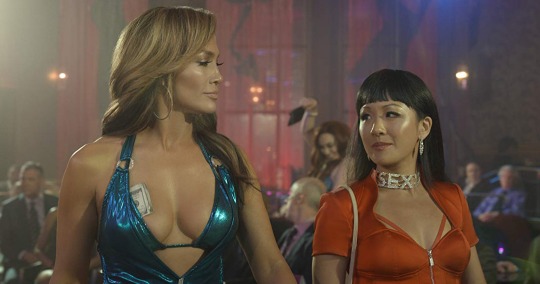
Inspired by the events revealed in the New York Magazine article “The Hustlers at Scores: Ex-Strippers Who Stole From (Mostly) Rich Men and Gave To, Well, Themselves” by Jessicar Pressler, Hustlers, directed by Lorene Scafaria (Seeking a Friend for the End of the World) is a strangely euphoric peek behind the debauched veneer of an industry that is deliberately shrouded in secrecy. Faithful to the source material, the narrative is structured around the testimony of Destiny (Constance Wu), a former stripper and mother, who retells the baffling story of her days under the tutelage of her friend and colleague Ramona Vega (Jennifer Lopez). Cloaked in rich furs, with a smouldering cigarette indefinitely drooping from her lips, Ramona is a wily and alluring enigma. In a jaw-dropping introductory scene, Ramona, contorts, shakes and pops her semi-naked frame, as an excitable crowd of punters shower her with a thunder-clap of dollar bills. It is an excellently executed scene, which not only serves to demonstrate Ramona’s evident talent, but also the physicality of the job and the dizzying heights of adoration and riches that the profession has to offer. Destiny’s aspirations become palatable to the spectator in an instance. It is not too long before Ramona and Destiny become acquainted which sets up a mother-daughter paradigm which indirectly plugs Destiny’s parental void. It also leads them both down a nefarious road of questionable decisions and darker consequences.
Hustlers is not a film that gets lost in the cheap sensationalism of convulsing flesh, like its masculine cousin Magic Mike. Scafaria’s picture is interested in moving backstage, to humanise and empower the girls who exploit themselves, often begrudgingly, to make ends meet. In the murky underbelly of the club, the moral quandaries of exploitation are wholly eclipsed by its pecuniary force of propulsion. Despite their dubious deeds, the female ensemble remain sympathetic because the identification between victim and violator is continually in flux. For the victims of their crimes are those who fucked the entire country with their reckless hubris - The Wall Street fat cats responsible for the financial crash of 2008. Scafaria goes to great pains to explain the dichotomy of the fat cat’s complicity in the involvement of propping up the industry and perpetuating its culture of degradation, and it also being single-handedly responsible for the industry’s collapse and the subsequent lengths that the women must take to continue to make a living. It is, perhaps, because of this, that Scafaria is able to achieve a level of celebratory breeziness, free of contrivance, with her material; finding sisterhood and empowerment in transgression.

That is the peculiar thing about Hustlers: from the moral smog emerges a soaring and effortlessly entertaining picture. In the same way in which Crazy, Rich Asians (another Wu picture) allowed its audience to penetrate the alien and haute extravagance of the billionaire bubble, Hustlers, does the same thing for the strip club, allowing its audience to sample its fruit without the seediness - to grasp its mechanics - to embrace those marginalised by tired prejudices and misguided preconceptions. However, it is hard to say how natural that embrace is. For, Scafaria is little interested in deconstructing her subjects’ psychology, or scrutinising their motivations and subsequent decisions. There is a certain amount of glossing done by Scafaria: parenthood, romantic relationships and drug use are completely glossed over in the quest for that feel-good rapidity of mainstream pacing. It is a decision which works, but feels a little myopic in the context of the world we are asked to inhabit. I suppose that is the issue with Scafaria’s picture, it’s fun but in the end a little too flippant - a little too sparkly - a little too jubilant for its own good.
6 notes
·
View notes
Text
Jojo Rabbit (2019)
Directed by Taiki Waititi
Rating: 86/100

Taika Waititi’s latest picture has sparked that age old debate concerning the evocation of traumatic events in fiction. It comes as no surprise when you consider the execution of his subject matter. Jojo Rabbit is a fantasy film that is set in Nazi Germany (or some other undisclosed occupied state). However, in this Nazi state, its Fuhrer Waititi glues on a toothbrush moustache, sticks on an SS uniform and prances around as an uber-camp manifestation of Adolf Hitler. I use the term manifestation quite deliberately, because this Hitler is merely the imaginary friend of Hitler Youth hopeful, Jojo (Roman Griffin Davis): a young boy who is blinded by the farrago of national socialistic jingoism and propaganda. He loves nothing more than donning a swastika, discussing the Jewish Question and, moreover, running around the woods playing soldier with the rest of the Hitler Youth, under the tutelage of failed Valkyrie, Captain Klezendorf (Sam Rockwell). The problem is, Jojo is a hapless little soldier. Unable to kill a rabbit to authorise his Aryan ruthlessness - hence the title of the film- Jojo becomes a social pariah. Friendless, aside from the affable Yorki (Archie Yates), and after a “disfiguring” grenade injury, Jojo ends up a bit part player in the movement.
Too much of an invalid and liability for the battlefield, Jojo soon discovers that his biggest battle is in the domestic sphere. His Mother (Scarlett Johanson) seems less than enthused about the Nazi Party. This is further compounded when Jojo discovers a Jewish Girl, Elsa (Thomasin McKenzie) hiding in his house. It is here where most of the comedy ensues. For Waititi’s comedy is not exploitative, but a tool to demonstrate the preposterousness of anti-semtic rhetoric and nazism. Through the myopic lens of Jojo, the war and its trauma takes on a quality of fantasy and unrealism only achievable through a child’s eyes. As the twists and turns of the Nazi regime take a more sombre personal turn for Jojo, his inherent Blakein innocence and goodness, starts to dilute the poison that he has been drinking in. His strained relationship with his projection of Hitler starts to show an onscreen cognitive dissonance - for Waititi’s Hitler, is not Hitler from the history books and rallies, but, rather, a silly, gesticulating springboard for Jojo to work through his inner-conflicts.
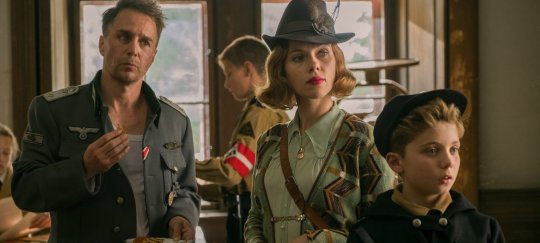
For the film’s good intentions, it does struggle to remain on the precarious tonal tightrope. Waititi shifts between pathos and comedy can often be little to fine, leading to a sense of confusion. Take the most pivotal death scene in the film. Waititi use of juxtaposition is so heartbreaking, it seems almost criminal that the emotional wrench is neutered by a bathos arising because we are still reeling from the comedy of the previous scene. However, there are times when a complex range of emotions are pulled off with an impressive aplomb. Take the scene stealing cameo by Stephen Merchant, for example, as a Gestapo officer. It is a scene which manages to be awkwardly funny and staggeringly intense at the same time. Waititi jumps between the two with polymathic ease: he drags the audience from one conflicting sensation to the other.
For Waititi’s film is all about conflict: the conflict between the warped mind and the everlasting purity of the heart.
#taiki waititi#jojo rabbit#film#review#roman griffin davis#scar#scarlet johansson#nazi#movie#sam rockwell#thomasin mckenzie#archie yates#what we do in the shadows
25 notes
·
View notes
Text
Good Boys (2019)
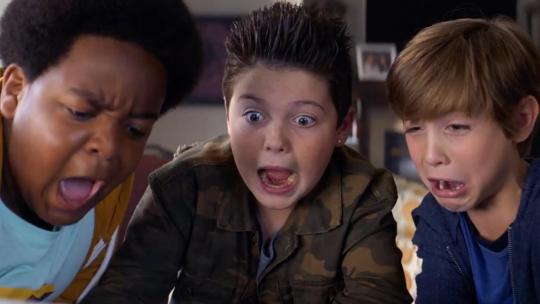
Directed By Gene Stupnitsky
Rating:67/100
Good Boys is essentially Bugsy Malone meets Superbad. Three hapless tweens, Max (Jacob Tremblay), Lucas (Keith L. Williams) and Thor (Brady Noon) - or as they prefer to be called "The Beanbag Boys" - are invited to a party where a kissing game will be on the agenda. The problem is none of them have the foggiest idea on how to kiss. Their subsequent thirst for unlocking the mystery leads them into a series of mishaps involving a drone, Ecstasy, sex dolls, paedophilic suspicion, dangerous road crossing and cool kids riding scooters. As the chain of events quickly transpires their hopes of attending the party become slimmer, as they face a swift grounding from their parents. Gene Stupnitsky's first directorial feature (he has writing credits on Bad Teacher and the admirable series Hello Ladies) is a raunchy and explicit comedy targeted towards adults but featuring children. It is a concept that one would think would wear thin quite quickly, but, surprisingly, it manages to hold for its fleeting duration.
For Good Boy's is a film whose humour comes from shock value and misunderstanding. Stupnitsky takes the familiar quest narrative, synonymous with frat-comedies, and flips it to hilarious effect. Sex is switched out for kissing, jocks take the form of sunshade donning scooter riders and harmless law-breaking becomes childish mischief. At the same time, Stupnitsky manages to capture one of the most honest portrayals of teenage-hood ever captured on screen. These are characters who are in that awkward transitional stage in their life, a period where they are beginning to see through their childhood allusions - and in some instances getting the complete wrong end of the stick. The theme of transition is embedded in the whole movie in fact. It a theme which Stupnitsky tries to shoehorn into add a profounder sense of meaning into the narrative to misdirect its exploitative nature, but it all feels a little clumsy and clawing. For Good Boys is just a delightful bit of exploitative and funny fluff. One which does not out stay its welcome!
#good boys#seth rogan#gene stupnitsky#film#review#movie#comedy#highschool#brady noon#jacob tremblay#keith l. williams
0 notes
Text
Wildfire (2018)
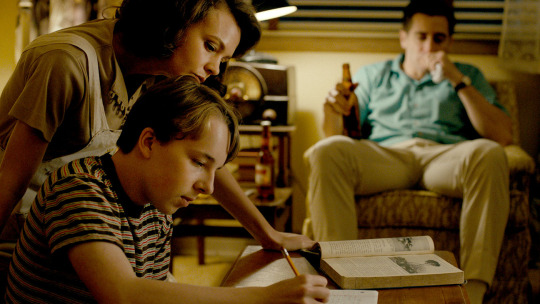
Directed by Paul Dano
Rating: 82/100
Paul Dano's directional debut, based on the Richard Ford novel of the same name, is a domestic drama which unfolds through the eyes of a teenager, who struggles to interpret a chain of social, economic and psychological events which lead to the break down of his parents's marriage. The film, set in the slumberous backwaters of 1960's Minnesota, begins with a scene straight from the American ideal, swiped from the advertising hoardings and television sitcoms : a young good-looking family living in quiet suburbia; where father throws ball with son; where mother attends to household duties; where they both encourage their son to put his studies and extra-circular activities before making easy money or loitering on street corners. It is an ideal which soon begins to show its cracks. Jerry (Jake Gyllenhaal) loses his job at the golf club, sending him into a spiral of depression and boozy apathy. Jeanette (Carey Mulligan) beginning to lose faith in her husband's propensity to find work, and worried that his nomadic impulses may take control of the family's destiny once again, decides to find herself a job and becomes a swimming teacher to keep the household economically afloat. Despite Jeanette's best intentions and support, Jerry is unable to find employment beyond bagging groceries, and decides to volunteer for the fire service: a notoriously dangerous job in Montana, where the wildfires are quickly turning its forests into fields of ash.
In the wake of Jerry's departure we see an almost instant transformation in Jeanette's behaviour. She bursts out of the rigid framework of the housewife and starts to find an independence which is both terrifying and liberating. It a shift that is jarring, but that is wholly intentional. For it is Joe's (Ed Oxenbould) bewilderment that we are experiencing. Jeanette's decision making seems flawed and without logic, but that it is because that is how Joe is interpreting it. For Jeanette shatters his childlike romantic illusions as she drifts further from Jerry. That is the brilliance of Dano's picture. As an audience we are asked, as we are by psychological thrillers, to find a semblance unattainable to the protagonist.
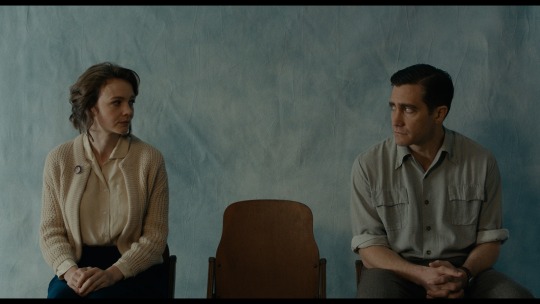
This somehow explains the unfair vilification of Jeanette. She is the more immediate and obvious threat to the unity of the family. However, that is because she is present and commits her acts of weakness before her son's eyes. Once we start to delve deeper to find her motivations, they become as clear as day. For Jeanette was a decent wife who indulged her husband's vision of the world - a vision roused by a naive and unwavering conviction in the American dream. Jerry abandons his family in this endless individualistic pursuit, leaving Jeanette to fend for Joe and herself. The physical abandonment, only serves to highlight the emotional abandonment which happened a long time before. In one particularly painful scene, Jeanette confesses to Joe that she and his father have not been intimate for a long time. It is a statement which Joe brushes off. He's a teenager after all, what does he know about the importance of intimacy? Stepping out from Jerry's shadow, Jeanette searches for security and intimacy, two things she has been unable to maintain in her marriage because of Jerry's aloofness. By the denouement of this quiet and touching film, we sympathise with all the casualties in the breakdown of the marriage and fear for their road to recovery.
1 note
·
View note
Text
Ingrid Goes West (2017)

Directed by Mark Spicer
Rating: 61/100
Living in the information age can be precarious. The internet has brought forth many new age problems, particularly concerning social media, such as disinformation, hacking and voyeurism. On a more quotidian level, there are also the issues which affect many of us more immediately. In a world where inter-connectivity is valued so highly and direct communication lies at our fingertips, paradoxically many of us find ourselves more lonely than ever before. Worse still, we start to measure ourselves against the manicured narratives which punctuate our timelines and construct our own in return to stave off the feeling of hopeless inadequacy which seep into the psyche. However, by doing this we become architects of a fictitious world of curated ideals. The psychological problems arise when the online world becomes blurred with our not so glossy reality. Matt Spicer's feature, Ingrid Goes West, is a cautionary comedy-drama which explores a lonely, young women's destructive and obsessive relationship with Instagram.
We are introduced to Ingrid (Aubrey Plaza) as she gatecrashes a wedding and proceeds to douse the bride in a fog of pepper spray. Subsequently, she is institutionalised. Whilst hospitalised her mother passes away, leaving her a substantial sum of inheritance. From the outset it is clear that Ingrid exhibits clear sociopathic traits which are exacerbated by an impervious and self-imposed solitude. Her only outlook and source of validation seems to be social media. Inspired by the Instagram influencers, whose projected rose-tinted lifestyles are chic and aspirational, Ingrid decides to follow in their footsteps by moving to bohemian California. The influencer of Ingrid's affections is Taylor (Elizabeth Olsen) who lives in a cutesy suburb with her hipster artist partner, Ezra (Wyatt Russell). It doesn't take long for Ingrid to plant herself into Taylor's life through a strange mixture of manipulation and dog kidnap. These are not the foundations for which a friendship should be built on, as Ingrid later learns. After the momentary bliss of a blossoming friendship, Ingrid and Taylor's relationship becomes just as vacuous and superficial as their constructed online presences. Although, this is more obvious to the audience than it is to Ingrid whose myopia has left her unable to separate fact from fiction, not that it appears that she values the distinction.
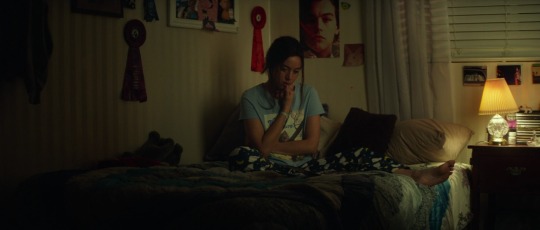
In this hollow, twinkly and woke world, Spicer does offer olive branches of humanity to Ingrid. Her landlord, Dan (O'Shea Jackson Jr.), is an affable budding screenwriter who quickly develops a crush on her. Despite his best efforts to help Ingrid settle or be empathetic, he is cast aside because he is not the right kind of person. His friends are not the right kind of people. It is Ingrid's snobbery and egotism which makes her unsympathetic as a character. Why should we care about a character who would happily squish us like bugs for the opportunity of achieving her vapid goal? The film is many ways succeeds despite Ingrid. We see shades of ourselves in this pretentious ensemble - these are shades which we gleefully see exposed to the light and eviscerated. For Ingrid is an exaggeration; a strange embodiment of information age wish-fulfilment, the apotheosis of our gloomy online impulses and frailties when left completely and utterly unchecked.
Plaza is as brilliant as ever, as her monotone protagonist lurches from one silly extreme to another. In fact all performances warrant a nod, particularly O'shea Jackson Jr and Billy Magnussen who turns up as Taylor's drug addict brother, Nicky, who starts to unravel Ingrid's deceptions. In the end we pity Ingrid because the other characters are cut from the same cloth, but escape a similar brand of justice than her because they are the winners of the game, mainly because they understand the charade. In the end, it is hard to know if Ingrid craves attention or affection. I doubt she knows the distinction. I doubt she cares.
#aubrey plaza#science fiction#review#social media#instagram#movie#christmas film#billy magnusson#elizabeth olsen#o'shea jackson jr.#wyatt russell#ingrid goes west
9 notes
·
View notes
Text
Marriage Story (2019)
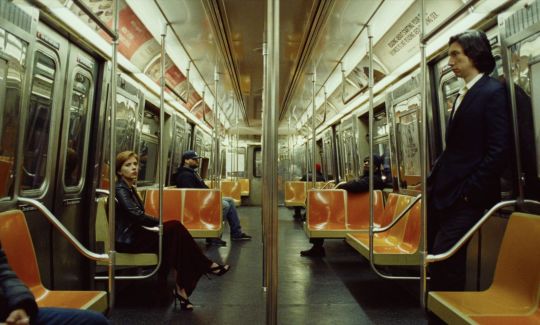
Directed by Noah Baumbach
Rating: 97/100
Baumbach's latest feature is a masterful exploration of love from its darkest vista: divorce. Nicole (Scarlet Johansson) and Charlie (Adam Driver) are a thespian couple on the verge of separation. Charlie is the director of a highly regarded theatre group, whilst Nicole is his muse, an actor who shunned the big screen in LA, in pursuit of loftier artistic ambitions on stage in New York. Although, both have a desire for the divorce to be executed as amicably, smooth and rational as possible, they soon discover that conflict is inevitability of the process - the biggest stickler being the custody of their son Henry (Azhy Robertson). Throw in a slick-talking and a not so slick talking lawyer (Laura Dern and Alan Alda), adultery and a MacArthur Grant into the equation and, suddenly, they find themselves in an uncontrollable mudslinging war.
The film opens with twin montages accompanied by the alternating narration of Charlie and Nicole. Both characters in their own idiosyncratic way explain the lovable idiosyncrasies of the other. It then cuts to the pair sitting in a mediation session with a therapist. The list is part of the separation process. Nicole is unable to read her list, Charlie is insistent they embrace the task (as does the therapist). The session inevitably collapses without any conciliatory penetration. It is a scene which in a way encapsulates the arc of the narrative. For, Baumbach is very cautious not to create monsters of his characters, but to skilfully and humanely dissect, with a deft tenderness rarely seen in cinema, the social flaws, psychological hang-ups and bureaucracy which leads his characters down the thorny path of manipulation and mutual loathing.
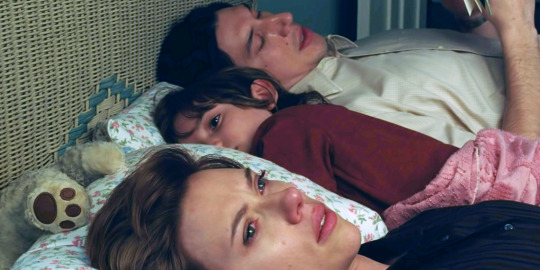
It is not that Charlie and Nicole are unable to talk to one another. In fact, their dialogues are measured, articulate and often honest. However, as the film develops it becomes clear that they have lost the ability to communicate with their hearts. They find themselves talking in a peculiar and polite doublespeak - mostly, one suspects, for the benefit of their impressionable son. Unable to express the inexplicable through dialogue, Baumbach uses the physicality of the actors, or the vacuousness of the setting, to puncture the veneer of liberal propriety and ideals which obfuscates the emotional anguish suffered by both of the characters: a glance of recognition, a sympathetic or intimate touch. Through the art of showing and not telling, Baumbach begins to trace the causation of the romantic breakdown. As the audience starts to acknowledge the mechanics and failings of the marriage, the characters simultaneously discover them too, leading to series of revelations and resolutions which help them to grow closer together as they move further apart.For Marriage Story is really a tragedy of the romantic illusion of marriage: A symbiosis which requires a permanence untenable in a world of shifting dreams and emotions. Despite this, Baumbach's film is not a dreary affair like its superb, distant relative Blue Valentine. Baumbach finds a perfect balance of levity and earnestness, which is executed with supreme impressiveness by his two leads. It is the kind of film that brings tears of joy and sorrow, sometimes, at the the same time.
7 notes
·
View notes
Text
Make Us Dream (2018)
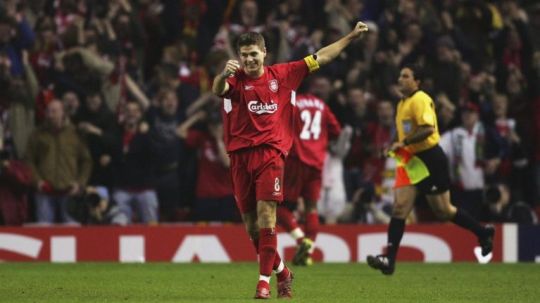
Directed by Sam Blair
Rating: 62/100
Pulling on the red jersey and stepping out under the floodlights of Anfield is a pipe-dream for many kids. On those cold weekend-league mornings and on the playground cobbles, children mimic the step-overs, the thirty-yard screamers and the sliding tackles of their footballing idols. My idol was Steven Gerrard - perhaps, the greatest ever player to kiss the liver bird and touch the iconic "We Are Liverpool" plaque hanging above the tunnel entrance. In Sam Blair's competent biographical documentary on the life of Gerrard, we are presented with his rise to stardom, his flirtation with rival clubs, the triumph of Istanbul and his illusive quest for a Premier League title. In many ways the film is a nostalgic celebration of a legacy defined by overcoming the odds, dedication and a myopic loyalty that is almost alien in the modern game. On the other hand, it is a revealing look at the extreme pressures placed on the individual when they becomes the beating heart of an entire city.
Although, the documentary can feel a little like skim reading an autobiography at times, or worse still, reading a Wikipedia article, Blair does add some insightful touches to encapsulate, or shed new light on some of Gerrard's most pivotal moments. In one section, Blair uses Gerrard's former teammate, Michael Owen, as a an examination of what Gerrard could have been if he had decided to sign for league rivals Chelsea - if he had cast aside the adoration and hero-worship of his fellow scousers in his hunt for accolades and a lucrative contract. Michael Owen ended up at prestigious Real Madrid, before moving to a myriad of different clubs and ending up in a peculiar loveless limbo, with no fan base to call his own. The film crescendo's in Istanbul where Liverpool completed a historical second half comeback against A.C. Milan in the 2005 Champions League Final. Instead of solely revelling in the dramatic scenes, Blair uses Gerrard's narration to offer a different perspective, one which is less about the pride of lifting the trophy, but the cathartic release of finally being able to bring joy and happiness to those who have gone without it for so long.
0 notes